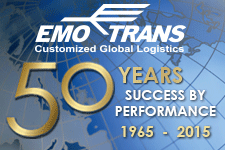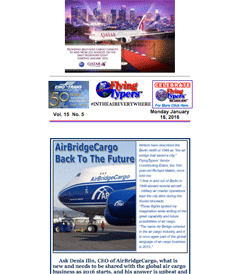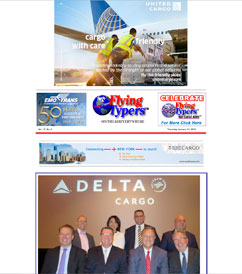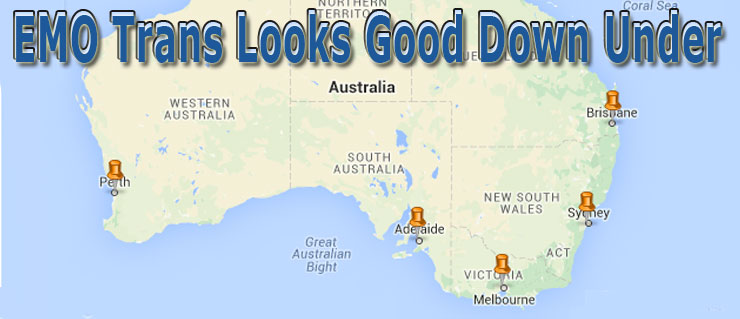
Preparing
a story about Ian Ahern, Managing Director (and pioneer)
of EMO Trans Australia, we are instantly struck by his
bearing, sense of place, force in fact, and straightforward
answers:
“Where is your CV?”
we ask.
“I am afraid I don’t
have one—Jo (Frigger, CEO of EMO Trans) might
start to worry if I did!” he smiles.
“I trained in medical
pathology … decided I would bore myself to death
looking at 40 more years of that.
“I went to the meat
industry, where I steadily had more and more to do with
logistics and sales. From that place in my life, it
was a very short journey into the sun at EMO Trans.”
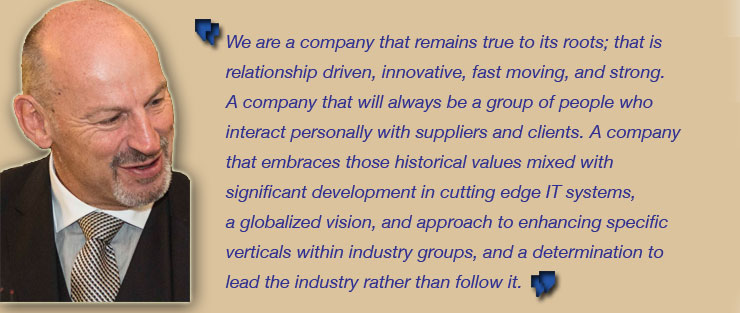
Half
century of EMO Trans
“EMO Trans has always
been a progressive company.
“Celebrating the
EMO Trans 50 Anniversary last year with our global colleagues
I believe provides a good focal point, which allowed
the management team to embrace the concepts that made
the company historically successful. It also created
a launch pad for redefining the future. The new focus
on expansion is a case in point. At this point in the
history of the company, it would be easy to sit back
and reflect. “Nothing
could be further from the truth, however, with the company
going through the largest program of growth in its history.”
A
Matter of Priorities
“With marketing,
(as opposed to sales), we look to provide awareness
to the marketplace in order to provide a platform to
highlight our strengths and advantages in specific verticals
with membership of industry bodies, attendance to trade
shows, advertising, and a heavy rotation of sales calls.
“This is not enough,
however.
“t is essential
to be able to provide real proof that your abilities
are not only as good as you claim, but that you stand
out far ahead of the industry norm.
“The best marketing
tool is a satisfied client who will recommend you in
the market.
“Therefore, your
highest priority always has to be excellence in the
provision of cost-effective services and advice to your
clients.
“It is not all about
clients, either.
“You cannot underestimate
the value of a solid and loyal relationship with your
service providers.”
Know
Who Your Friends Are
“The
airlines are not your enemies, their advice and help
is an integral part of the success of any forwarding
company.
“Loyalty absolutely
needs to work both ways, and there are ‘horses
for courses,’ but building friendships and creating
an understanding between both the airline and the forwarder
cannot be underestimated.”
Air
Cargo Ahead In 2016
“The primary concern
is that when the fuel price increase comes (and sooner
or later it will), it will impact the airline industry
as a whole.
“The industry has
strength, but not in any depth.
“The concern is
that a significant number of airlines will find survival
impossible at that time.
“This will heavily
impact on space and therefore cost rises over and above
that of the fuel cost itself.
“Adding to this
problem will be the viability of ‘freighter only’
services and the impact of further reduction in capacity
in that sector.
“This is particularly
troublesome in this region as there are no land based
freight options into the South Pacific, and sea freight
is at least a 40-day transit from the major the major
production blocks of Europe and the U.S.”
Cast Back To 2015
“The Australasian
economy has been hit by the downturn in commodity and
oil pricing.
“Furthermore, there
has been a significant and sharp fall in the value of
regional currencies against the U.S. dollar.
“Given that the
market for forwarders here is largely import based,
this can impact consumers, forcing a reduction in spend
and the flow on effects through the logistics chain.
“Yet we have seen
not only resilience in the face of these factors, we
have indeed seen growth in some business sectors.
‘The low oil price
is supporting this optimism in the domestic market to
some extent, but that said, in a backdrop of global
discussions on a decline in Chinese growth, and the
factors above, the buoyancy in the market is, to a degree,
unexpected.”
Dealing
With Change
 “To
some extent we insulate ourselves from erratic changes
in the market by way of our long-term client (and service
provider) partnerships. “To
some extent we insulate ourselves from erratic changes
in the market by way of our long-term client (and service
provider) partnerships.
“These partners
are strong, resilient companies who, like ourselves,
are mid-sized and hold trusted relationships based on
service and honesty.
“That said you must
always be on watch for new trends in business.
“When these trends
appear, you must be able to make fast management decisions
in order to position yourself at the forefront in the
development of new products to cater to these market
trends.
“Finally and probably
most critically is investment in leading-edge IT systems.
“As we all are aware,
margins are ever thinner, competition is ever greater,
and managing overheads critical to the survival/success
of any logistics company.
“Very often the
primary focus for IT is based around tracking and tracing
to the client.
“True, this is important,
but this information realistically comes as a by-product
of a good IT system—one that provides the logistics
provider with accurate reporting data by which good
business decisions can be made.
“Modern systems
are also based around minimizing staffing levels required
to enact mundane tasks (such as data entry).
“With personnel
costs the major expense to any operation, this is an
area where the smallest savings can have a large impact.
“That is not to
say that we want to get away from personal one-on-one
relationships with our clients.
“On the contrary,
this is the most important facet of our company/client
‘experience.’ Good IT enables our management
and staff, thus allowing for more time and better information
for our team to talk with both service providers and
clients, enhancing the relationship for all.”
Meet
Ian Ahern
A common mistake whilst
talking to this most literate spokesman of transportation
is thinking that his accent places him (to the untrained
ear) as an Australian.
Ian, who constantly pays
all due respect to anything Australian, was in fact
born and raised in New Zealand.
Asking him ‘What
makes New Zealand great?’ should be followed with
the admonition ‘Don’t get him started!’
“Everyone knows
of New Zealand’s spectacular scenery, which it
certainly has.
“But really it is
the attitude of the people . . . innovation
and a self-belief that belies the small population size
and remoteness of the country itself.
“New Zealanders
are a diverse and interesting lot with reach far beyond
our shores . . . think Burt Munro (the
world’s fastest Indian), Bill Hamilton (who invented
the Jet Boat), and Richard Pearse (contemporary of the
Wright Brothers).
“All I think are
fine examples of the type of person the country develops.
“Mix those folks
with the likes of Sir Edmond Hillary (Everest), All
Blacks (World Champion Rugby) or being in the top 12
countries for Olympic medals per head of population
(the U.S. comes in around number 40), New Zealand adds
up to a nation of people that truly ‘can do.’”
Time
Off For Certain
Ian,
of course, has a tongue-in-cheek answer when it comes
to the question of what he does to relax:
“There is no relaxation
to be had in the area of airfreight.
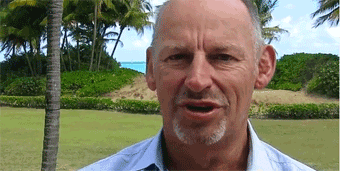 “As
we all know, air cargo is an industry that never sleeps,”
Ian laughs. “As
we all know, air cargo is an industry that never sleeps,”
Ian laughs.
“Having my wife
Yulia involved (and very dedicated) in the company,
there aren’t too many hours at home that aren’t
involved around EMO Trans in some way or other.
“Weekends therefore
form an important part of recharging.
“We have a well
set up yacht moored close to home on which we enjoy
spending weekends away, and a 1957 Thunderbird ‘Sunday’
car for getting out of the city.
“We enjoy scuba
diving as well, although that needs to be a tropical
pursuit. In short we always find things to do, and are
never still for very long.
“I am immensely
proud that my daughter Christie is heading to University
for veterinary studies in New Zealand.”
He notes that amongst
the Aherns' most cherished moments outside of air cargo
was their last trip to Vavau in Tonga (paradise on earth)
and “the whales that you swim with (the only place
on earth where you can legally do this).”
“I am lucky to work
with a great team of managers that allow me to spend
time out of the office (either work related or on holiday).
“Once a year we
go to that small island in the Vavau group in Tonga.
“It is about as
remote as you can get on earth.
“The island is owned
by a very special couple and it is very small—only
4 couples stay at any one time. There’s
sun, sea, fishing, diving, and the most special part,
actually swimming with the aforementioned humpback whales.
“Vavau is the only
place that we are aware of where this is possible,”
Ian said.
If
Not In Air Cargo?
“The short answer
would be to retire . . . but boredom
doesn’t sit well with me.
“Honestly, I don’t
know (or particularly mind) which industry, so long
as it is challenging, fast moving, and provides a feel-good
factor.”
Fitting
Into The Global Market
“As we are so remote
from the global market in Oceania, and since the 40
million people that live across this region do not form
a major trade block (North Asia/North America/Europe
for example is measured in populations in the billions),
airline services to the region are quite firmly tourism/pax
centric.
“Following on from
the Sydney 2000 Olympics, we saw major changes and reductions
in the airlines servicing the region. There was a swing
away from traditional European/U.S. carriers (with the
exception of BA and to a lesser extent United, most
of them have now ceased operations below the major Asian
hubs of HKG/SIN/BKK) leaving the Asian (and more recently,
the large Middle Eastern) operations to service the
region in conjunction with Qantas/Air New Zealand and
Air Niugini. Freighter services also significantly reduced
over this same period. Freighters now omit BNE, ADL,
and PER.
“Of course, the
remote nature of the region means long transit for liner
services, therefore there is no shortage of pressure
on inbound cargo space, and as such pricing for space
is firm (also due to the distances).
“This situation
is not helped by the comparatively small outbound volume,
which would normally allow cost offset.
“All of those points
given, we are serviced effectively in the area and rarely
struggle for space allocations. The rise of the Middle
Eastern airlines has provided the largest positive impact.
This benefit is probably felt most in New Zealand where,
due to parking space restrictions in SYD means 3 EK
380’s spend each night in AKL.
“In the next 5 years,
SYD will have a second airport (albeit a distance from
the city itself). Exactly how this will be serviced,
and its role with cargo, is yet to become clear.”
Exceeding
Expectations
“We are a company
that remains true to its roots; that is relationship
driven, innovative, fast moving, and strong. A company
that will always be a group of people who interact personally
with suppliers and clients. A company that embraces
those historical values mixed with significant development
in cutting edge IT systems, a globalized vision, and
approach to enhancing specific verticals within industry
groups, and a determination to lead the industry rather
than follow it.”
A
Matter of Virtues
“The one word answer
in my view is ‘Care.’ All staff members
must care for themselves, their colleagues, and their
clients, then positive results will flow for that company,
clients, and suppliers.
“Basically put,
if you have respect you will go the extra mile to learn,
understand, respond, and provide results above expected
in each facet of the role that is entrusted to you.
This philosophy cannot be taught to an individual. The
challenge as a manager is to find individuals and put
together a team that have this inherently. All other
skill sets can be taught.
“From my point of
view, this means that the best thing that I can do is
do my job with the same care and do it well. Be available,
be responsible, and be the best that I can be. Earn
the role that is entrusted to you, then you can hope
to provide some inspiration for others to share that
culture.”
View
Toward Better Air Cargo
“There needs to
be a realization globally that we need the aviation
industry and that the industry as a whole needs to be
financially resilient in order to survive.
“The fact is that
one banking corporation can post more profit in 12 months
than all global airlines combined, and that does not
point to long term resilience.
“Capital requirements
are enormous, there are pressures from wildly fluctuating
fuel costs and costs associated with large levels of
staffing, we have high maintenance overheads—and
that is without speaking of security and insurance costs
associated with acts of terror. All this, and yet there
remains huge pressure from the market to provide ticket
prices that are in real terms lower than they have ever
been in history.
“There needs to
be awareness from both within and without the industry
that pricing ‘brinkmanship’ is not a sustainable
model,” Ian Ahern assures.
Geoffrey
|
